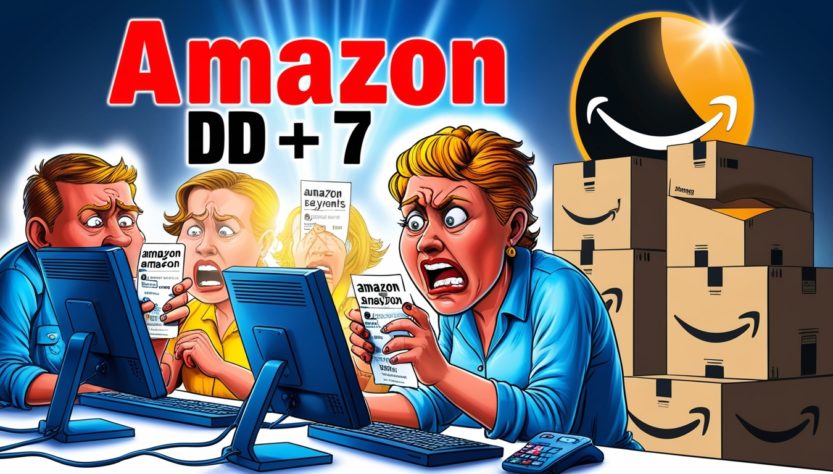Amazon’s New DD+7 Payment Policy Sparks Outrage: “They’re Holding Our Money Hostage”
Amazon’s latest policy change—the introduction of the DD+7 payment system—has ignited a firestorm of outrage among third-party sellers. This new policy, which delays payment to sellers for seven days after an order is delivered, has been slammed as a blatant cash grab that’s wreaking havoc on sellers’ businesses. For many small businesses operating on tight margins, this could be the final straw.
Amazon claims the DD+7 policy is designed to safeguard against refunds, chargebacks, and customer complaints. But sellers aren’t buying it. Instead, they see it as another way for Amazon to hold onto their money for longer, bolstering its own cash flow at the expense of those who rely on timely payments to keep their businesses afloat.
What Exactly is DD+7?
Amazon’s new DD+7 policy reserves seller payments for seven days after an item is marked as delivered. Previously, sellers would receive their disbursements more promptly after dispatch, but now the extended wait time is causing significant financial strain. Amazon explains that this new policy gives time for any disputes or returns to be processed, ensuring funds are available to cover these situations.
But sellers aren’t convinced. The e-commerce giant’s justifications are falling on deaf ears as merchants vent their frustrations across forums and social media. One seller summed it up best:
“They’re holding our money hostage. I sell something on January 1st, it’s delivered on January 6th, and I won’t see a dime until January 14th—maybe even later! In the meantime, Amazon is sitting on my money, making interest off of it. This isn’t about protecting customers, it’s about padding their bottom line.”
The Growing Resentment Among Sellers
Sellers are furious, and they aren’t holding back. Many are taking to the Amazon seller forums to share how the DD+7 policy is affecting their businesses. The delay in disbursements is causing severe cash flow issues for small business owners, particularly those with high sales volumes who rely on steady payments to replenish stock and cover expenses.
One seller expressed their frustration with how long they have to wait for their money:

“I’ve been hit by this DD+7 nonsense and it’s a nightmare. I can see over £10,000 in sales from last week, but I can’t access a penny. I’ve got bills to pay, suppliers to settle with, and Amazon is holding onto MY money. I can’t keep operating like this.”
For some sellers, the delay extends even further due to Amazon’s use of outdated BACS payment methods, which can take an additional 5-7 business days to transfer funds. One frustrated seller pointed out how much faster payments are processed on other platforms like eBay and Etsy:
“eBay pays me the next morning, even if I sell something at 8pm the night before. Amazon? I have to wait nearly three weeks sometimes to see my money. It’s ridiculous, and they’re using us like a bank.”
Another seller echoed the frustration:
“How can eBay process payments instantly, but Amazon takes weeks? They’re living in the dark ages. It’s 2024, not 1994. Sellers like us are paying the price.”
Impact on Cash Flow: “It’s Unsustainable”
For many small businesses, the DD+7 policy isn’t just an inconvenience—it’s a financial crisis. Sellers who rely on steady cash flow to restock inventory and cover business costs are finding themselves stretched thin, and some are already taking out loans just to stay afloat. One seller shared how they’ve had to rely on borrowing to keep their operations running:

“I’ve had to take out loans just to restock. All because Amazon is holding my money for weeks. This isn’t sustainable. I’m literally paying interest on money I should already have in my bank account. Amazon doesn’t care—they’re making a profit while I struggle to survive.”
Many sellers also pointed out the absurdity of having thousands of pounds tied up in Amazon’s system while they’re unable to touch it. One seller described it as “crippling”:
“We’re sitting here with £5,000 locked up by Amazon, and we can’t access it. How are we supposed to pay suppliers or ship more products when our own money is being held hostage? This policy is crippling us, and they don’t even care.”
Amazon Lending: Is This All a Ploy for More Profit?
Skepticism is mounting over Amazon’s true motives for introducing the DD+7 policy. Many sellers believe that Amazon is deliberately creating cash flow issues to push sellers towards Amazon Lending—the company’s business loan service. By withholding funds, Amazon is effectively driving sellers to take out loans, allowing the company to make interest on money that should have been paid out.
As one seller put it:
“It’s a scam. Amazon holds onto our money so that we’re forced to take out loans—loans from Amazon! They’re making interest on both sides: our delayed payments and the loans they offer to ‘help’ us. It’s infuriating.”
This sentiment is echoed across multiple forums, where sellers are accusing Amazon of using the DD+7 policy to boost its profits at their expense. One seller angrily remarked:
“This is corporate greed at its worst. Amazon is making millions, if not billions, in interest by holding onto our payments. They don’t care if we go under—they’ll just find more sellers to exploit.”
Comparing Amazon to Other Platforms: “They’re Falling Behind”
The frustration among sellers is only exacerbated when they compare Amazon’s slow disbursements to other platforms like eBay and Etsy. Both of these competitors offer much quicker payouts, with eBay processing payments within 24 hours and Etsy following closely behind. Sellers are baffled by Amazon’s inability—or unwillingness—to keep up with industry standards.

“Etsy and eBay pay within a day. Even OnBuy does better. Amazon is supposed to be the biggest e-commerce platform in the world, but they can’t get payments out on time? It’s a joke. They’re falling behind.”
The stark difference in payment processing times is pushing many sellers to consider moving away from Amazon altogether, exploring alternatives where they can have more control over their cash flow. One seller, disillusioned by the DD+7 policy, shared their plans to shift focus:
“I’ve been with Amazon for 14 years, but this might be the end. I can’t keep working like this. eBay, Etsy, and even my own website are looking like better options right now. Amazon has made it clear they don’t care about us.”
The Growing Exodus: Sellers Reaching Their Breaking Point
The DD+7 policy appears to be the tipping point for many sellers who have already been grappling with rising fees, increasing competition, and Amazon’s ever-tightening grip on its marketplace. With payment delays now thrown into the mix, many sellers are considering leaving Amazon entirely.
One long-time seller expressed their frustration with the platform’s constant changes:
“I’ve been on Amazon for over 20 years, and there’s no loyalty left. They keep changing the rules, raising fees, and now they’re holding onto our money. I’m done. I’m moving to eBay and focusing on my own store. At least there, I have control over my business.”
For sellers with high-value stock sitting in Amazon’s warehouses under the Fulfilled by Amazon (FBA) program, the situation is even more frustrating. They’ve already paid for inventory, shipping, and storage, yet they’re still being forced to wait weeks for payments. One seller voiced their disbelief:
“I’m paying Amazon to store my stock, paying them to ship it, and now I have to wait weeks for the money I’m owed? This system is completely backwards.”
Conclusion: The Breaking Point for Amazon Sellers
Amazon’s DD+7 policy has pushed many sellers to their breaking point. While the company claims the policy is in place to protect buyers, sellers see it as yet another way for Amazon to squeeze profits at their expense. For small businesses relying on timely payments to keep operations running, the delay is more than just an inconvenience—it’s a potential death sentence.
As more and more sellers speak out, the anger is palpable. The DD+7 policy is the latest in a long line of frustrations that have eroded trust between Amazon and its sellers. Many are now considering whether it’s worth staying on a platform that seems more intent on boosting its bottom line than supporting the businesses that helped build it.
“We’re the ones who built this platform. Now Amazon is bleeding us dry. I’m done. It’s time to move on.”
For Amazon, the question remains: will they listen to their sellers, or will they continue down a path that drives merchants away in search of greener pastures?

